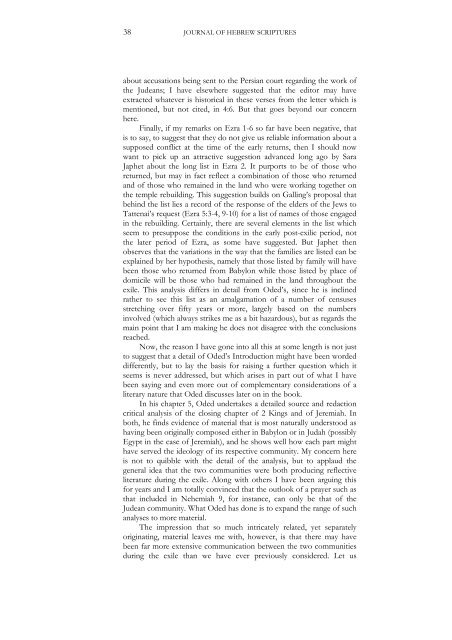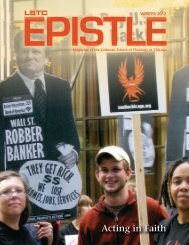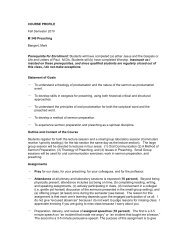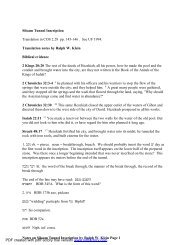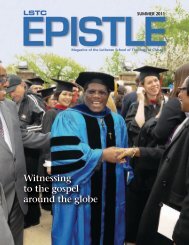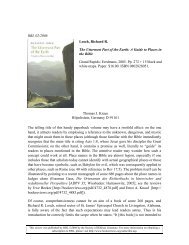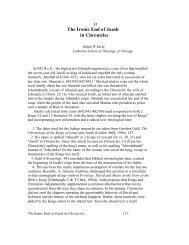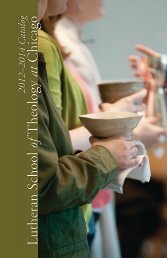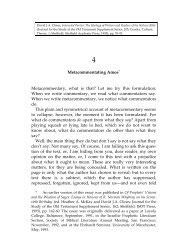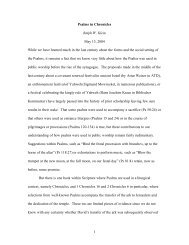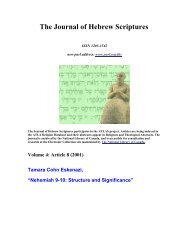Download this PDF file - University of Alberta - Journal Hosting
Download this PDF file - University of Alberta - Journal Hosting
Download this PDF file - University of Alberta - Journal Hosting
You also want an ePaper? Increase the reach of your titles
YUMPU automatically turns print PDFs into web optimized ePapers that Google loves.
38JOURNAL OF HEBREW SCRIPTURESabout accusations being sent to the Persian court regarding the work <strong>of</strong>the Judeans; I have elsewhere suggested that the editor may haveextracted whatever is historical in these verses from the letter which ismentioned, but not cited, in 4:6. But that goes beyond our concernhere.Finally, if my remarks on Ezra 1-6 so far have been negative, thatis to say, to suggest that they do not give us reliable information about asupposed conflict at the time <strong>of</strong> the early returns, then I should nowwant to pick up an attractive suggestion advanced long ago by SaraJaphet about the long list in Ezra 2. It purports to be <strong>of</strong> those whoreturned, but may in fact reflect a combination <strong>of</strong> those who returnedand <strong>of</strong> those who remained in the land who were working together onthe temple rebuilding. This suggestion builds on Galling’s proposal thatbehind the list lies a record <strong>of</strong> the response <strong>of</strong> the elders <strong>of</strong> the Jews toTattenai’s request (Ezra 5:3-4, 9-10) for a list <strong>of</strong> names <strong>of</strong> those engagedin the rebuilding. Certainly, there are several elements in the list whichseem to presuppose the conditions in the early post-exilic period, notthe later period <strong>of</strong> Ezra, as some have suggested. But Japhet thenobserves that the variations in the way that the families are listed can beexplained by her hypothesis, namely that those listed by family will havebeen those who returned from Babylon while those listed by place <strong>of</strong>domicile will be those who had remained in the land throughout theexile. This analysis differs in detail from Oded’s, since he is inclinedrather to see <strong>this</strong> list as an amalgamation <strong>of</strong> a number <strong>of</strong> censusesstretching over fifty years or more, largely based on the numbersinvolved (which always strikes me as a bit hazardous), but as regards themain point that I am making he does not disagree with the conclusionsreached.Now, the reason I have gone into all <strong>this</strong> at some length is not justto suggest that a detail <strong>of</strong> Oded’s Introduction might have been wordeddifferently, but to lay the basis for raising a further question which itseems is never addressed, but which arises in part out <strong>of</strong> what I havebeen saying and even more out <strong>of</strong> complementary considerations <strong>of</strong> aliterary nature that Oded discusses later on in the book.In his chapter 5, Oded undertakes a detailed source and redactioncritical analysis <strong>of</strong> the closing chapter <strong>of</strong> 2 Kings and <strong>of</strong> Jeremiah. Inboth, he finds evidence <strong>of</strong> material that is most naturally understood ashaving been originally composed either in Babylon or in Judah (possiblyEgypt in the case <strong>of</strong> Jeremiah), and he shows well how each part mighthave served the ideology <strong>of</strong> its respective community. My concern hereis not to quibble with the detail <strong>of</strong> the analysis, but to applaud thegeneral idea that the two communities were both producing reflectiveliterature during the exile. Along with others I have been arguing <strong>this</strong>for years and I am totally convinced that the outlook <strong>of</strong> a prayer such asthat included in Nehemiah 9, for instance, can only be that <strong>of</strong> theJudean community. What Oded has done is to expand the range <strong>of</strong> suchanalyses to more material.The impression that so much intricately related, yet separatelyoriginating, material leaves me with, however, is that there may havebeen far more extensive communication between the two communitiesduring the exile than we have ever previously considered. Let us


